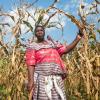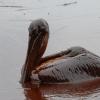Climate & Environment
 On the second day of the Right Here, Right Now Global Climate Summit, keynote speaker and former Irish President Mary Robinson took the stage to get people riled up and excited about making change on the climate change front through women-led efforts, such as Project Dandelion.
On the second day of the Right Here, Right Now Global Climate Summit, keynote speaker and former Irish President Mary Robinson took the stage to get people riled up and excited about making change on the climate change front through women-led efforts, such as Project Dandelion. From groundbreaking research to community engagement to optimizing their own operations, universities are positioned to play a leading role in addressing the human rights crisis of climate change–both globally and locally.
From groundbreaking research to community engagement to optimizing their own operations, universities are positioned to play a leading role in addressing the human rights crisis of climate change–both globally and locally.
 Nearly 4,000 people from 90 countries convened at CU Boulder, either virtually or in-person Friday, for a day-long, candid exploration of something speakers contend isn’t talked about enough: how climate change impacts people’s lives right now.
Nearly 4,000 people from 90 countries convened at CU Boulder, either virtually or in-person Friday, for a day-long, candid exploration of something speakers contend isn’t talked about enough: how climate change impacts people’s lives right now. Speaking to the packed room on her birthday, Sheila Watt-Cloutier quipped that when many people living in the United States think about the Arctic, their minds go to a hallmark of capitalism: soda commercials—the ones where polar bears frolic with seals on the ice.
Speaking to the packed room on her birthday, Sheila Watt-Cloutier quipped that when many people living in the United States think about the Arctic, their minds go to a hallmark of capitalism: soda commercials—the ones where polar bears frolic with seals on the ice. On the first day of the inaugural Right Here, Right Now Global Climate Summit at CU Boulder, local leaders focused on local community impacts of climate change in an adjacent track of panels.
On the first day of the inaugural Right Here, Right Now Global Climate Summit at CU Boulder, local leaders focused on local community impacts of climate change in an adjacent track of panels.
 Mitigating climate change by significantly reducing carbon emissions this decade will require big transitions in all sectors, from energy and transportation to construction and industry. But significant reductions in global emissions are possible, experts say.
Mitigating climate change by significantly reducing carbon emissions this decade will require big transitions in all sectors, from energy and transportation to construction and industry. But significant reductions in global emissions are possible, experts say. Clint Carroll, associate professor in the Department of Ethnic Studies, studies Cherokee access to gathering wild plants and land use management, and tends to the land in his own backyard.
Clint Carroll, associate professor in the Department of Ethnic Studies, studies Cherokee access to gathering wild plants and land use management, and tends to the land in his own backyard. With the planet already warming, technical fixes to addressing a changing climate are important, experts say, but they can only get us so far. We need social fixes, too.
With the planet already warming, technical fixes to addressing a changing climate are important, experts say, but they can only get us so far. We need social fixes, too. In the book "Homo Ecophagus," a physician with CU Boulder ties sees humanity devouring itself—and the planet.
In the book "Homo Ecophagus," a physician with CU Boulder ties sees humanity devouring itself—and the planet. At the COP27 climate conference in Sharm El Sheikh, Egypt, the Right Here, Right Now Global Climate Alliance—an international initiative supported by CU Boulder and others—announced the Human Rights Climate Commitments. The first draft of the commitments will be an outcome of the Right Here, Right Now Global Climate Summit on campus Dec. 1–4.
At the COP27 climate conference in Sharm El Sheikh, Egypt, the Right Here, Right Now Global Climate Alliance—an international initiative supported by CU Boulder and others—announced the Human Rights Climate Commitments. The first draft of the commitments will be an outcome of the Right Here, Right Now Global Climate Summit on campus Dec. 1–4.


